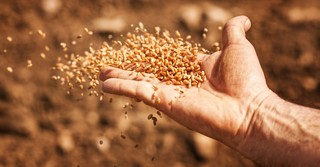- Recent Translations
- All Translations
Matthew 13:3
Share
Settings
Matthew 13:3 Meaning and Commentary
And he spake many things unto them in parables
For the parables of the sower, and the different sorts of ground the seed fell in, of the wheat and tares, of the grain of mustard seed, of the leaven in three measures of meal, of the treasure hid in a field, of the pearl of great price, of the net cast into the sea, and of the householder, were all delivered at this time. This way of speaking by parables was much in use among the eastern nations, and particularly the Jews. R. Meir was very famous among them for this way of teaching: they say F1,
``that when R. Meir died, (Mylvm ylvwm wljb) , "they that were skilled in, and used parables, ceased".''The commentators F2 on this passage say,
``that he preached a third part tradition, and a third part mystical discourse, (yltm atlytw) , "and a third part parables":''which method of discoursing was judged both pleasant and profitable, and what served to raise the attention of the hearer, and to fix what was delivered the more firmly in their minds: what was our Lord's reason for using them, may be seen in ( Matthew 13:13 ) . He begins with the parable of the sower. The design of which is to set forth the nature of the word of God, the work and business of the ministers of it, the different success of the preaching of it, and the fruitfulness of it; and to show when it is truly received, and the various degrees of fruit it produces; that the efficacy of it depends on the grace of God, which makes the heart good, and fit to receive it; and how few they be which hear the word to any spiritual advantage and benefit; and how far persons may go in hearing, and yet fall short of the grace of God; and therefore no dependence is to be had on the external hearing of the word.
Behold, a sower went forth to sow;
Luke adds, "his seed"; as does also Munster's Hebrew Gospel here; and Mark introduces the parable thus, "hearken, behold!" it being a matter of great importance and concern, which is expressed by this parable, it deserves the most diligent attention. By "the sower" is meant "the son of man", as may be learnt from the explanation of another parable, ( Matthew 13:37 ) which is Jesus Christ himself, who is often so called on account of his human nature; and may the rather be thought to be intended here, since the seed he sowed is called "his seed"; meaning the Gospel, of which he is the author, publisher, sum and substance; and since he is, by way of eminency, called (o speirwn) , "the sower"; which must be understood of him as a prophet, or preacher of the word, who was eminently sent of God, and richly qualified for such an office, and was most diligent in it, and yet his success was but small. Indeed, every minister of the Gospel may be called a sower, who bears precious seed, sows spiritual things, and though in tears, he shall not return empty, but shall reap in joy, and bring his sheaves with him. This sower "went forth" from his own house to his field; which, as applied to Christ, may intend his incarnation, his coming into this world by the assumption of human nature, his appearance in the public ministry, in the land of Judea, and his going forth still in his ministers, and by his Spirit, in the preaching of the Gospel; and, as applied to the preachers of the word, may be explained of their commission, of their being sent, and of their going forth into the field of the world, preaching the Gospel every where. The end of the sower's going forth is to "sow his seed": by "his seed" is meant the word, the word of God; see ( Mark 4:14 ) ( Luke 8:11 ) so called, because of the choiceness and excellency of it in itself, that grain which is reserved for seed being usually the best of the kind; and because of its smallness, it being mean and contemptible in the eyes of those, who know not the nature of it; and because of the generative virtue it has, though not without a divine influence. Nor does it bring forth fruit, unless it is sown in the heart, as seed in the earth; where its operation is secret, its growth and increase gradual, and its fruitfulness different. By "sowing", is meant preaching; which, as sowing, requires knowledge and skill, and an open and liberal hand; keeping back nothing that is profitable, a declaring the same doctrine in one place as another; and designs a constant ministration of it, notwithstanding all discouragements, and a patient waiting for success.
F1 Misn. Sota, c. 9. sect. 15.
F2 Jarchi & Bartenora in ib. e Talmud. Bab. Sanhedrim, fol. 38. 2.
